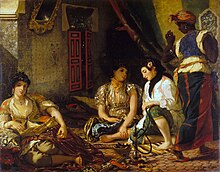The bedroom of Mornay
Upon his return he painted Women of Algiers in their Harem, which was exhibited at the Salon of 1834. Delacroix claimed to have gained access to the women's quarters of a Muslim household and witnessed the scene first-hand; however, the work contains many elements of the Western stereotype about harems. This work is considered the most important work from Delacroix's journey.[1]

The artist also created scenes of fantasia, a North African tradition in which Arab tribesmen fire their guns while spurring their horses.[2] In his personal writings, Delacroix expressed how deeply impressed he was by these powder plays.
Contribution to French Orientalism
editIn 1832, the Count took the French Romantic painter Eugène Delacroix with him on a diplomatic mission to Tangier, exposing the artist to life outside of cloudy, overcast Paris.[3] Over the course of his six months in North Africa, Delacroix executed a number of pencil and watercolor sketches in seven notebooks, depicting the Moroccan architecture, landscape, and people, which served as artistic inspriation for the remainder of his career.[4]
- ^ Rosenthal, Donald A. (1982). Orientalism, the Near East in French painting, 1800-1880. Rochester: University of Rochester.
- ^ Chu, Petra ten-Doesschate (2012). Nineteenth-Century European Art, 3rd ed. London: Laurence King Publishing, Ltd. pp. 217–219.
- ^ Chu, Petra ten-Doesschate (2012). Nineteenth-Century European Art, 3rd ed. London: Laurence King Publishing, Ltd. pp. 217–219.
- ^ Rosenthal, Donald A. (1982). Orientalism, the Near East in French painting, 1800-1880. Rochester: University of Rochester.